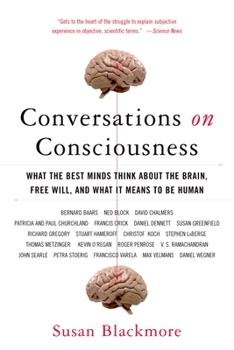Conversations on Consciousness: What the Best Minds Think about the Brain, Free Will, and What It Means to Be Human
Select Format
Select Condition 
Book Overview
In Conversations on Consciousness, Susan Blackmore interviews some of the great minds of our time, a who's who of eminent thinkers, all of whom have devoted much of their lives to understanding the concept of consciousness. The interviewees, ranging from major philosophers to renowned scientists, talk candidly with Blackmore about some of the key philosophical issues confronting us in a series of conversations that are revealing, insightful, and stimulating...
Format:Paperback
Language:English
ISBN:0195179595
ISBN13:9780195179590
Release Date:January 2007
Publisher:Oxford University Press
Length:288 Pages
Weight:0.61 lbs.
Dimensions:0.6" x 5.5" x 8.5"
Customer Reviews
2 ratings
Blackmore's "Conversations on Consciousness" Offers Tons of Information Presented in a Unique Manner
Published by Thriftbooks.com User , 16 years ago
Introduction and Overall Thoughts: Susan Blackmore is a writer who holds an enthusiastic obsession over what consciousness means and how current research is attempting to define conscious in terms of scientific principles. Her book, "Conversations on Consciousness" is a collection of 20 interviews, with 21 of the leading thinkers on consciousness. Blackmore interviewees represent a variety of backgrounds, and showcase the purpose of the book: researchers cannot come close to agreeing on much of anything involving defining consciousness. The book contains a wealth of knowledge, each presented in a least `textbook' manner as possible. However, the arbitrary alphabetical organization (based on the interviewees last name) of the book favors readers well aware of the theories and experiments in defining consciousness. This may be the only drawback the book holds, as the questions and responses are very detailed and conjure up images of watching the interview transpire. Format of Book: The introduction explains the book came about through a failed BBC project. The project fell through, but Blackmore decided the conversations were so vivid they would suffice as a book. She then lays down the framework for each interview, as the same general questions would be asked to each interviewee to give some continuity and of course for comparison. The questions: -Why consciousness is treated so differently? -What brought the interviewee to study consciousness? -Questions about the interviewee's theory, and opinions to reactions of it. -Does a philosophical zombie exist? -Is there such thing as free will? -What happens to us after death, in specific the conscious? -How has studying consciousness affected your life? Opinion of Book: Content: Blackmore offers an interesting collection of varied opinions on consciousness. Prior to reading this book, I had little to no understanding of what consciousness was or how we currently interpret it. What I came to understand was I held the now `primitive' belief established by Descartes, dualism, or the separation of mind and body. The book immediately throws you into the current affairs of consciousness research, which is both good and bad. The good aspect of this comes from seeing the wonderfully detailed and vivid opinions, which these scientists and philosophers hold. Unfortunately, neophytes to current affairs are thrown to a level beyond what the introduction mentions. In a sense, I felt the introduction needed an introduction, or some detailed preface section outlining the very basic concepts in the glossary. For example, after reading the book I noticed two very important common threads in many of the interviews. First, nearly every interviewee had an opinion on David Chalmers `hard problem'. In the introduction, Blackmore mentions the hard problem, but not in enough detail or emphasis. Due to the alphabetical arrangement of the interviewees, Chalmers does not come up until the third interview. I know one may
Very impressive book
Published by Thriftbooks.com User , 18 years ago
That was a brilliant idea of Sue Blackmore, and the results are quite impressive. This book does what it was designed to do - it involves anyone (I believe) who reads it in the "hard problem of consciousness", that is in reflection on explanations of the fact of subjective experience arising from neural structures (there are a few other themes debated here like the problem of free will, but they are marginal - with an exeption of zombie-problem, which, however, is closely connected with "hard problem"). We see different approaches to the "hard problem" and a clash of philosophers, like Dennett, with scientists, like Crick or Koch. It became clear, however, that scientists are in need of philosophers these days. By the way, most elaborate responses in these conversations came from philosophers - Chalmers, Dennett, Velmans etc. So far - OK. Why only 4 stars then? Because the book is imbalanced, and Sue knows that. First of all, among her 20 "best minds" there are no Chomskian philosophers - Chomsky would probably refuse to respond - Fodor, McGinn, Pinker. Then where are Identity theorists - Armstrong or Smart? Why Edelman is not included in the list? Where is Kim? And so on. Of course, it is not easy to achieve balance in such projects. But still it is possible - I myself did something like that, collecting more than 100 opinions of Kant scholars in 2004 - so called "International Kant Interview". So Sue Blackmore did not do her best - but she did much. Her book helps to feel the progress in consciousness studies.







